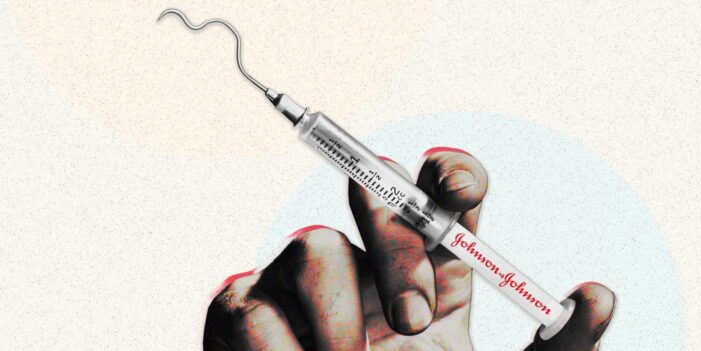Worry About Johnson & Johnson COVID Vaccine Safety Persists

Worry about the safety of the Johnson & Johnson/Janssen experimental human advenovirus COVID-19 vaccine persists after a ten-day pause on distribution of the vaccine earlier this year.1 Food and Drug Administration (FDA) warnings of heart and neurological issues2 and, most recently, a published study suggesting that the J&J vaccine is far less effective against the Delta variant of SARS-CoV-02 have added to public confidence issues.3 Despite acknowledged potential risks and public hesitancy about use of the vaccine, on July 22, 2021 Centers for Disease Control and Prevention (CDC) researcher Hannah Rosenbaum told the CDC’s Advisory Committee on Immunization Practices (ACIP) that the vaccine is still safe despite potential risks.4
In April 2021, federal health agencies called for a nationwide pause on the distribution of the Johnson & Johnson vaccine to examine a blood clotting disorder that emerged in six women who received the vaccine.1 Ten days after issuing the pause, the FDA and CDC lifted the pause, reassuring the public that health officials had conducted “a thorough safety review.”5 Prior to the nationwide pause, several individual states including North Carolina, Colorado, and Georgia stopped distribution of the J&J vaccine after reports of adverse reactions, which included some hospitalizations.6 At the time Centura Health, a large Colorado healthcare organization, stated they would no longer administer the Johnson & Johnson vaccine at their drive-up locations, citing both shortages and the prevalence of adverse reactions.7
Those who have closely followed clinical trials of the experimental COVID-19 vaccines, which are now being distributed in the U.S. under an Emergency Use Authorization (EUA) granted to manufacturers by the FDA, know that mild to serious adverse reactions to the Johnson & Johnson/Janssen vaccine occurred throughout clinical trials. During these trials, which began last fall, over half of the participants experienced mild to moderate adverse reactions, while 20 volunteers suffered what were considered severe reactions. In October 2020, trials were paused “to evaluate an unexplained illness in a study participant.”8
In response to reports of the vaccine site shut downs, Business Insider reports that Johnson & Johnson stated any adverse reactions would be taken seriously and that “there is no greater priority than the safety and well-being of the people we serve.”9
J&J Aware of Asbestos Contaminating Baby Powder for Decades
Johnson and Johnson made that statement just months after the company’s regulatory filing revealed the company must set aside $3.9 billion to cover costs of lawsuits regarding its baby powder laced with asbestos.10 For decades, Johnson & Johnson was aware of talc contaminated with asbestos in their popular baby powder but denied and concealed that insider information from the public. Reuters reported that court documents, including company memos and other internal documents, reveal that Johnson & Johnson officials had knowledge of the asbestos contamination issue from 1971 to the early 2000s. The documents and court testimonies demonstrate that “company executives, mine managers, scientists, doctors and lawyers fretted over the problem and how to address it while failing to disclose it to regulators or the public.”11
Newsweek reported that these highly publicized contaminated baby powder lawsuits have contributed to hesitancy about use of the J&J COVID vaccine, Johnson & Johnson refused to comment but the company stated that their vaccine adheres to the “highest bioethical standards and guidelines.”12
J&J Recalls Several Spray Sunscreens After Discovering Carcinogen Contamination
Last month, Johnson & Johnson recalled multiple spray sunscreens after “significantly detected” levels of the known carcinogen benzene was found in 40 of 78 tested products. The company advised consumers to discontinue use immediately and discard the products.13
J&J Paid Out Millions of Dollars for “False” Marketing Linked to Opioid Crisis
In 2019, an Oklahoma judge ordered Johnson & Johnson to pay $572 million for their aggressive false marketing campaign that played a role in the opioid crisis, resulting in thousands of deaths.14
Oklahoma Judge Thad Balkman stated that over 326 million opioid pills, enough for every adult to have 110 pills, were dispensed to Oklahoma residents and that “4% of Oklahoma babies born in 2017 had neonatal abstinence syndrome.” Oklahoma Attorney General Mike Hunter estimated that reversing the crisis will cost over $17 billion over the next 30 years.15
As reported in The New York Times, Abbe R. Gluck, JD, a Yale professor who teaches health policy and law, stated:
The critical finding is that Johnson & Johnson engaged in false, deceptive and misleading marketing.
Findings of the court hearings report that Johnson & Johnson sales staff made 150,000 visits to doctor’s offices, “focusing in particular on high-volume subscribers”.16 Various other U.S. cities and states brought forward lawsuits against Johnson & Johnson and other pharmaceutical companies for their role in the opioid epidemic. Payouts for Johnson & Johnson alone so far have totaled $5 billion.17
J&J Made “False and Misleading Claims” to Push Use Risperdal in Vulnerable Populations
Johnson & Johnson has also repeatedly found itself at the forefront of ongoing billion-dollar lawsuits for promoting the schizophrenia drug Risperdal for off-market uses not approved by the FDA. These unapproved uses included the controlling and treatment of behavioral issues in elderly nursing home residents, children, and individuals with mental disabilities. The company paid kickbacks to physicians to prescribe the drug.18
“J&J’s promotion of Risperdal for unapproved uses threatened the most vulnerable populations of our society–children, the elderly, and those with developmental disabilities,” said U.S. Attorney General Zane Memeger. “This historic settlement sends the message that drug manufacturers who place profits over patient care will face severe criminal and civil penalties.”18
The New York Times reported in April that Johnson & Johnson was planning to pursue clinical trials for the COVID-19 vaccine on other populations that were not included in initial clinical trials, including pregnant women and infants in the near future.19
If you would like to receive an e-mail notice of the most recent articles published in The Vaccine Reaction each week, click here.
Click here to view References:
No comments:
Post a Comment